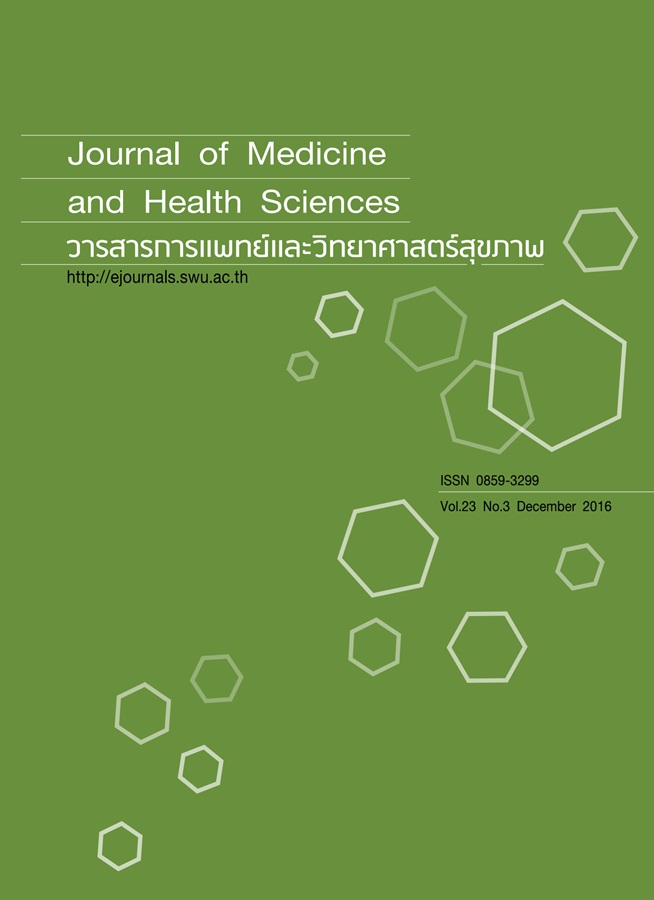The effectiveness of experience-based approach diarrhea prevention in preschool children ประสิทธิผลของการสอนแบบอิงประสบการณ์เพื่อการป้องกันโรคอุจจาระร่วงในเด็กก่อนวัยเรียน
Keywords:
experience-base approach, diarrhea, preschool children การสอนแบบอิงประสบการณ์ โรคอุจจาระร่วง เด็กก่อนวัยเรียนAbstract
Abstract
This research was aimed to study effectiveness of experience-based approach for diarrhea prevention program in preschool children. Quasi experimental research was done with 80 male and female preschool children age range from 4 to 5 years old who were in the 3rd year kindergarten at Ongkharak Demonstration School, Ongkharak, NakhonNayok. Two groups were recruited and classified as an experimental group and a control group; each group consisted of 40 subjects. Study instruments consisted of two educational plans; 1) Experience-based approach for diarrhea prevention among preschool children and 2) Ordinary lesson following early education courses (2003). Data was collected by diarrhea knowledge and skills questionnaires and observation of diarrhea prevention behavior in preschool children. Data was analyzed by paired t-test, Independent sample t-test and ANCOVA to calculate percentage, means, standard deviations. The results showed that mean score knowledge and skills of the experimental groups were significantly higher than both pre-experiment and control group (p<0.05) and behavior for diarrhea prevention in preschool children of the experimental groups were significantly higher than both pre- experiment and control group (p<0.05).This result indicated that experience-based approach for diarrhea prevention program in preschool children had effectiveness on promoting knowledge, skill, and behavior in order to prevent diarrhea in preschool children.
บทคัดย่อ
การศึกษาวิจัยครั้งนี้มีวัตถุประสงค์เพื่อศึกษาประสิทธิผลของการสอนแบบอิงประสบการณ์สำหรับการป้องกันโรคอุจจาระร่วงในเด็กก่อนวัยเรียน ใช้รูปแบบการดำเนินงานการวิจัยเชิงกึ่งทดลอง (Quasi Experimental Research) ศึกษากับเด็กก่อนวัยเรียน ที่มีอายุ 4 – 5 ปี ที่กำลังศึกษาอยู่ในระดับชั้นเด็กเล็ก โรงเรียนสาธิตมหาวิทยาลัยศรีนครินทรวิโรฒ องครักษ์ อำเภอองครักษ์ จังหวัดนครนายก จำแนกเป็น กลุ่มทดลอง 40 คน และกลุ่มควบคุม 40 คน เครื่องมือที่ใช้วิจัยประกอบด้วย แผนการสอนแบบอิงประสบการณ์สำหรับการป้องกันโรคอุจจาระร่วงในเด็กก่อนวัยเรียน และแผนการสอนตามหลักสูตรการศึกษาปฐมวัย พุทธศักราช 2546 เก็บรวบรวมข้อมูลด้วยแบบทดสอบความรู้และทักษะเกี่ยวกับโรคอุจจาระร่วง และแบบสังเกตพฤติกรรมการป้องกันโรคอุจจาระร่วง วิเคราะห์ข้อมูลโดยใช้สถิติ ร้อยละ ค่าเฉลี่ย ส่วนเบี่ยงเบนมาตรฐาน Paired t-test Independent sample t-test และ ANCOVA ผลการศึกษาพบว่า คะแนนเฉลี่ยในเรื่องของความรู้และทักษะสำหรับการป้องกันโรคอุจจาระร่วงในเด็กก่อนวัยเรียน มีคะแนนเฉลี่ยสูงกว่าก่อนทดลองและสูงกว่ากลุ่มควบคุม อย่างมีนัยสำคัญทางสถิติ (p<0.05) และคะแนนเฉลี่ยการปฏิบัติพฤติกรรมสำหรับการป้องกันโรคอุจจาระร่วงในเด็กก่อนวัยเรียนมีคะแนนเฉลี่ยสูงกว่าก่อนทดลองและสูงกว่ากลุ่มควบคุม อย่างมีนัยสำคัญทางสถิติ (p<0.05) ผลการศึกษาแสดงให้เห็นว่าโปรแกรมการสอนแบบอิงประสบการณ์มีประสิทธิผลในการส่งเสริมความรู้ ทักษะ และพฤติกรรมการป้องกันโรคอุจจาระร่วงในเด็กก่อนวัยเรียนได้



